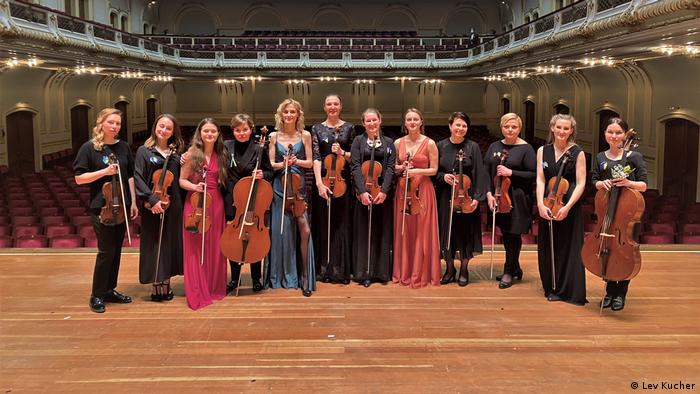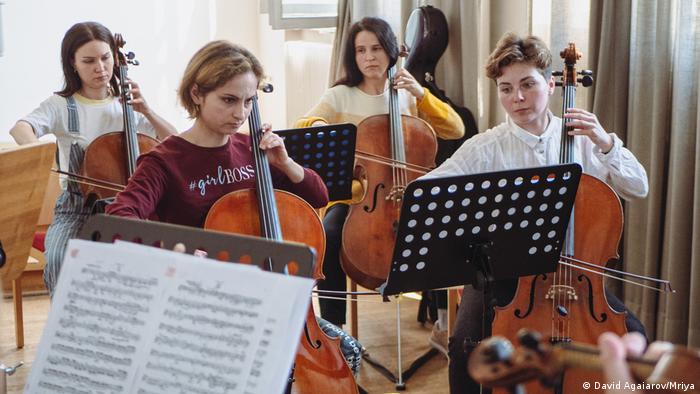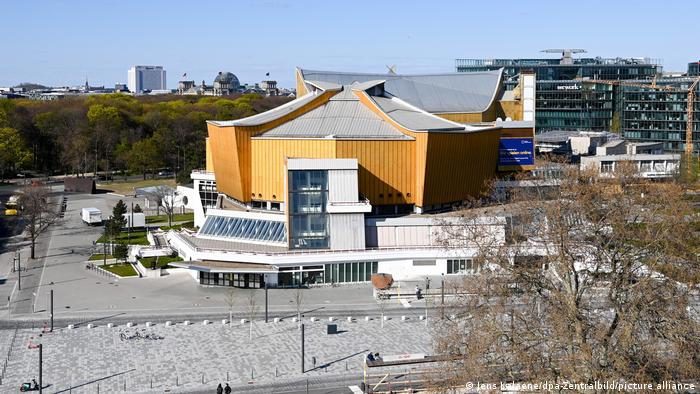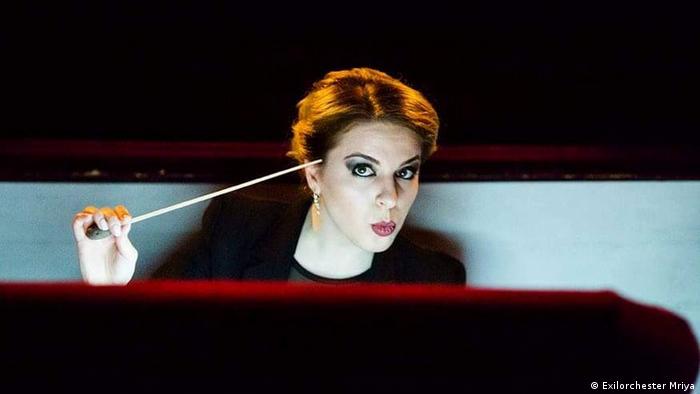The orchestra is called Mriya, the Ukrainian word for "dream" — because its musicians dreamed of making music despite the war. It was created in March by Ukrainians who have fled their home country and since then, more than 30 musicians have joined in.
Margaryta Grynyvetska is one of its more recent members. The conductor of the Odesa National Academic Opera and Ballet Theater fled right at the beginning of the Russian invasion of Ukraine. She met with two friends to create music together. "I did not imagine that our first meeting would take place on a big stage like the Berliner Philharmonie," she told DW.
On May 10, the Mriya Orchestra is taking the stage with a mixed program of German classics and Ukrainian contemporaries at the concert hall in Berlin.

Working with a big network Deutsche Welle
Working with a big network
Backed by funding from the aid organization Alliance4Ukraine, the orchestra pays tribute to those who are standing up for Ukraine and helping people leave their war-torn country.
The musicians are also collaborating with the Berliner Philharmonie to create work opportunities for professional artists from Ukraine.
When it comes to finding a place to stay, looking for rehearsal halls or concert locations, the Hamburg-based organization Culture Connects, which was created in 2018, offers concrete help. Roman Ohem, chairman of the association, has been organizing chamber concerts with Ukraine musicians in Germany for the last seven years. With the help of his friend, cellist Lev Kucher, he created the website Mriya.de.
"For me, the whole thing is a very personal matter," Ohem says. "We simply created a list of fleeing professional musicians from Ukraine using our contacts. They signed up with the aim that we help them."
Roman Ohem has been involved with musicians even during the Syrian war and also helped out as a violinist in the Syrian exile orchestra. "In this manner, the musicians can blossom and are free," he says. The playbook, the program and the rehearsal plans are thus all created by the musicians themselves.

Rehearsing for the concert Deutsche Welle
Top-class program in Berlin
Everyone who plays in Mriya — men have also meanwhile joined in — has worked as a professional musician in their country.
The orchestra's founder is the famous violist Kateryna Suprun. Hanna Tsurkan, solo violinist for the "Carpathian Rhapsody" by the Ukrainian composer Myroslav Skoryk, has won prizes at several international competitions and is a member of the National Symphony Orchestra of Ukraine. Before her stint as conductor in Odesa, Margaryta Grynyvetska also worked with the famous conductor Oksana Lyniv, with the Bayerische Staatsoper in Munich and also in Luxor, Egypt.
The program for the concert on May 10 at the Berliner Philharmonie includes Wolfgang Amadeus Mozart's Concerto for Two Pianos in E flat major (Piano Concerto No.10), played by the Ukrainian star pianist Kateryna Titova and her prize-winning compatriot, pianist Artem Yasynskyy.
Johann Sebastian Bach's famous Violin Concerto in A minor is also featured. The orchestra is also playing music by contemporary composers, including Valentyn Silvestrov. His work "Silent Music" is currently being played at several concerts in Germany.The composer Myroslav Skoryk, whose work is also part of the program, is also popular for his string orchestra compositions.

The Berliner Philharmonie Deutsche Welle
For Margaryta Grynyvetska, playing music from her home country is a very emotional affair. She noticed it at a concert she was conducting in the Lithuanian capital of Vilnius.
"I was close to tears when I realized that our life, which we had in Ukraine, will never be the same again," she said. "I don't know when I will go back to my beloved Odesa, in my house, my home. That is why it is very important for us to play this music, to have this connection with our country."
Women in the majority
The orchestra features mostly female violinists and woodwind players. Men appear only for a short time, Margaryta Grynyvetska says: "All men are now soldiers are we are fighting at the cultural front, so to speak. That is our task."
Roman Ohem is now advocating for male musicians to get an extraordinary permit to leave Ukraine, but that is difficult, "They can leave the country only if their musical work abroad is of more use than them using weapons." That is the only reason for approving travel abroad for male musicians.
Meanwhile, in Germany, Margaryta Grynyvetska often has the feeling that the Ukraine war has already become a normality. "That is why it is important for us to show that war is a serious situation and that the Ukrainians desperately need help and support," she says.
Support with enthusiasm
Anyone who thinks that Ukrainian musicians can play at the venues for free is wrong, says Roman Ohem. "We pay €11,000 ($11,600) in rent to the Philharmonie. There is no discount and I personally have taken a loan of €11,000 with my German account and the association."
His modest stipend, which he received as a freelance artist during the pandemic, has also flowed into aid projects. "Our concerts are 100% charity, which means, everything that is surplus goes immediately to Ukraine." The concert in the Berlin Philharmonic is, among others, supported by the German orchestra foundation, the Deutsche Orchester-Stiftung. The proceeds are used for medical aid for war victims. For Ukrainian concert-goers, the event is also free.











